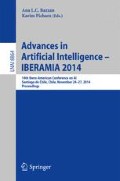Abstract
Argumentation is a form of reasoning where a claim is accepted or rejected according to the analysis of the arguments for and against it; furthermore, it provides a reasoning mechanism able to handle contradictory, incomplete and uncertain information in real-world situations. We combine Bipolar Argumentation Frameworks (an extension of Dung’s work) with an Algebra of Argumentation Labels modeling two independent types of interaction between arguments, representing meta-information associated with arguments, and introducing an acceptability notion that will give more information for arguments acceptability.
Access this chapter
Tax calculation will be finalised at checkout
Purchases are for personal use only
Preview
Unable to display preview. Download preview PDF.
References
Alsinet, T., Chesñevar, C.I., Godo, L., Sandri, S., Simari, G.R.: Formalizing argumentative reasoning in a possibilistic logic programming setting with fuzzy unification. International Journal of Approximate Reasoning 48(3), 711–729 (2008)
Amgoud, L., Cayrol, C., Lagasquie-Schiex, M.C., Livet, P.: On bipolarity in argumentation frameworks. International Journal of Intelligent Systems 23(10), 1062–1093 (2008)
Amgoud, L., Prade, H.: Using arguments for making and explaining decisions. Artificial Intelligence 173(3), 413–436 (2009)
Barringer, H., Gabbay, D., Woods, J.: Temporal, numerical and meta-level dynamics in argumentation networks. Argument & Computation 3(2–3), 143–202 (2012)
Bench-Capon, T., Dunne, P.E.: Argumentation in artificial intelligence. Artificial Intelligence 171(10), 619–641 (2007)
Boella, G., Gabbay, D.M., van der Torre, L.W., Villata, S.: Support in abstract argumentation. In: Computational Models of Argument (LNCS), pp. 111–122 (2010)
Budán, M.C.D., Lucero Gómez, M.J., Chesñevar, C.I., Simari, G.R.: Modelling time and reliability in structured argumentation frameworks. In: Proceedings of the 13th International Conference on Principles of Knowledge Representation and Reasoning, pp. 578–582 (2012)
Budán, M.C.D., Lucero, M.J.G., Simari, G.R.: An aif-based labeled argumentation framework. In: Beierle, C., Meghini, C. (eds.) FoIKS 2014. LNCS, vol. 8367, pp. 117–135. Springer, Heidelberg (2014)
Cayrol, C., Lagasquie-Schiex, M.C.: Graduality in argumentation. Journal of Articial Intelligence Research (JAIR) 23, 245–297 (2005)
Cayrol, C., Lagasquie-Schiex, M.C.: On the acceptability of arguments in bipolar argumentation frameworks. In: Godo, L. (ed.) ECSQARU 2005. LNCS (LNAI), vol. 3571, pp. 378–389. Springer, Heidelberg (2005)
Cohen, A., Gottifredi, S., García, A.J., Simari, G.R.: A survey of different approaches to support in argumentation systems. The Knowledge Engineering Review (FirstView 2013)
Dung, P.M.: On the acceptability of arguments and its fundamental role in nonmonotonic reasoning, logic programming and n-person games. Artif. Intell. 77(2), 321–357 (1995)
Dunne, P.E., Hunter, A., McBurney, P., Parsons, S., Wooldridge, M.: Weighted argument systems: Basic definitions, algorithms, and complexity results. Artif. Intell. 175(2), 457–486 (2011)
García, A.J., Chesñevar, C.I., Rotstein, N.D., Simari, G.R.: Formalizing dialectical explanation support for argument-based reasoning in knowledge-based systems. Expert Syst. with Apps 40(8), 3233–3247 (2013)
García, A.J., Simari, G.R.: Defeasible logic programming: An argumentative approach. TPLP 4(1–2), 95–138 (2004)
Godo, L., Marchioni, E., Pardo, P.: Extending a temporal defeasible argumentation framework with possibilistic weights. In: del Cerro, L.F., Herzig, A., Mengin, J. (eds.) JELIA 2012. LNCS, vol. 7519, pp. 242–254. Springer, Heidelberg (2012)
Gómez, S.A., Chesñevar, C.I., Simari, G.R.: Ontoarg: A decision support framework for ontology integration based on argumentation. Expert Syst. with Apps 40(5), 1858–1870 (2013)
Pollock, J.L.: Defeasible reasoning and degrees of justification. Argument and Computation 1(1), 7–22 (2010)
Rahwan, I., Simari, G.R.: Argumentation in Artificial Intelligence. Springer (2009)
van der Weide, T.L., Dignum, F., Meyer, J-JCh., Prakken, H., Vreeswijk, G.A.W.: Multi-criteria argument selection in persuasion dialogues. In: McBurney, Peter, Parsons, Simon, Rahwan, Iyad (eds.) ArgMAS 2011. LNCS, vol. 7543, pp. 136–153. Springer, Heidelberg (2012)
Zadeh, L.A.: Fuzzy sets. Information and Control 8(3), 338–353 (1965)
Zimmermann, H.: Fuzzy set theory and its applications, 2nd revised edn. Springer (1992)
Author information
Authors and Affiliations
Corresponding author
Editor information
Editors and Affiliations
Rights and permissions
Copyright information
© 2014 Springer International Publishing Switzerland
About this paper
Cite this paper
Budán, M.C.D., Viglizzo, I., Simari, G.R. (2014). A Labeled Abstract Bipolar Argumentation Framework. In: Bazzan, A., Pichara, K. (eds) Advances in Artificial Intelligence -- IBERAMIA 2014. IBERAMIA 2014. Lecture Notes in Computer Science(), vol 8864. Springer, Cham. https://doi.org/10.1007/978-3-319-12027-0_3
Download citation
DOI: https://doi.org/10.1007/978-3-319-12027-0_3
Published:
Publisher Name: Springer, Cham
Print ISBN: 978-3-319-12026-3
Online ISBN: 978-3-319-12027-0
eBook Packages: Computer ScienceComputer Science (R0)

